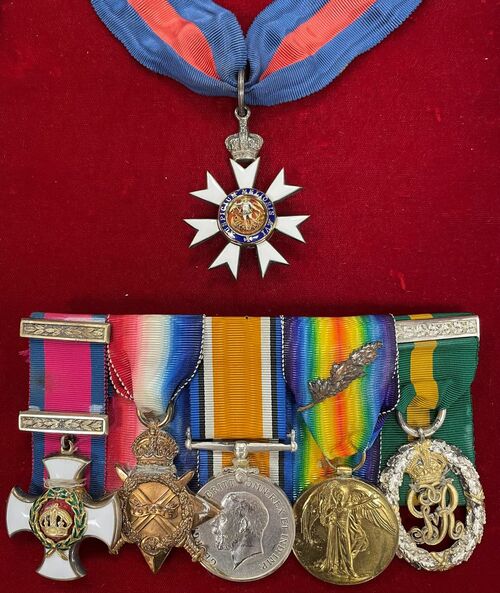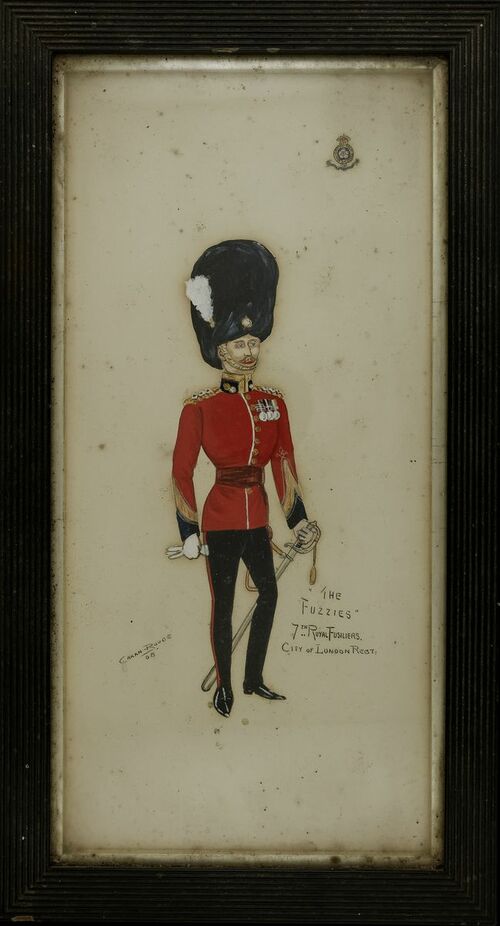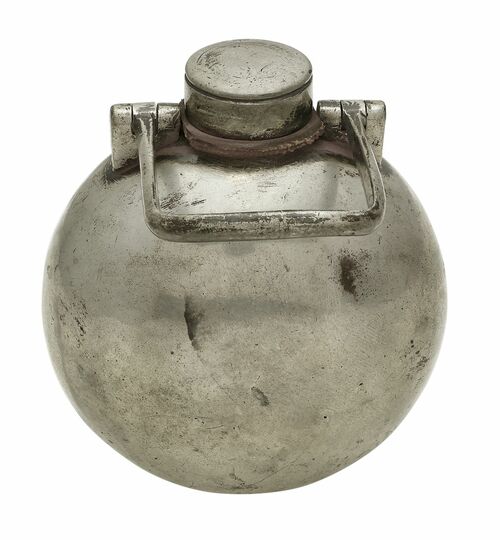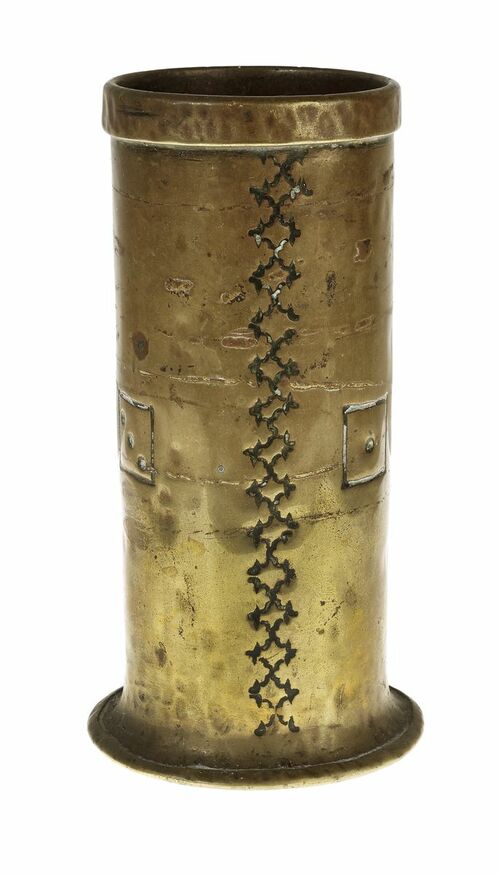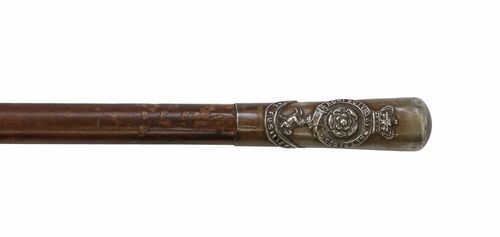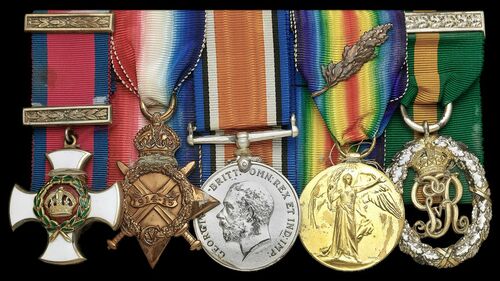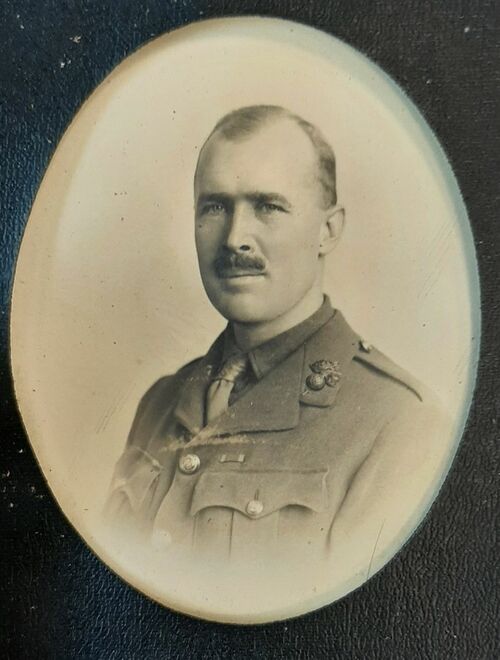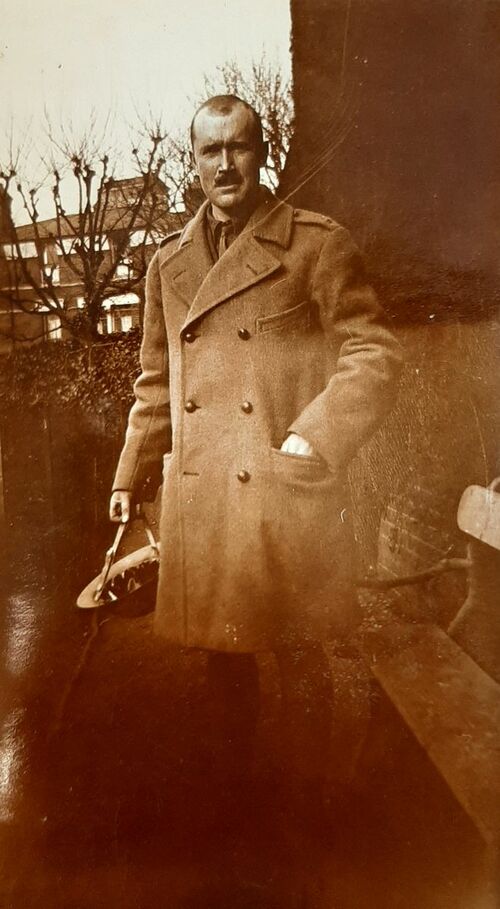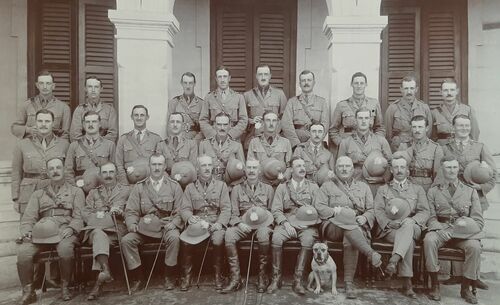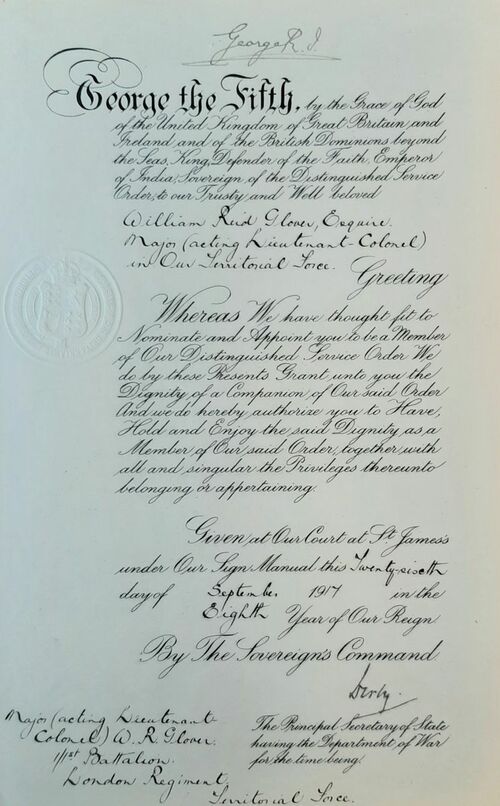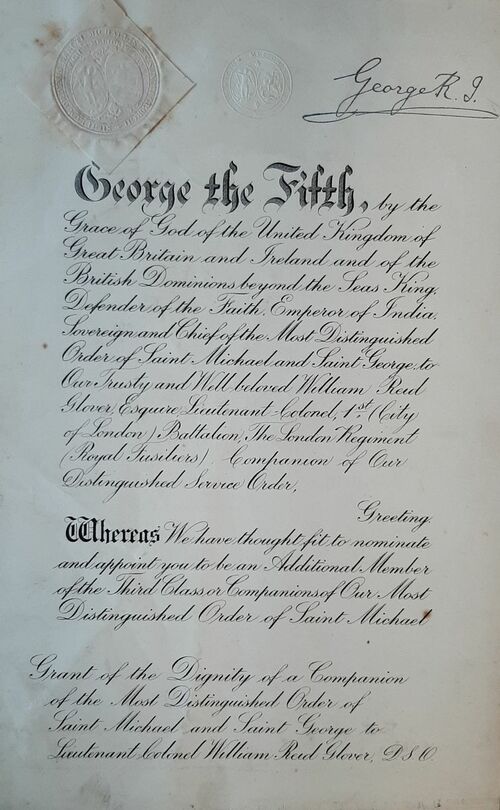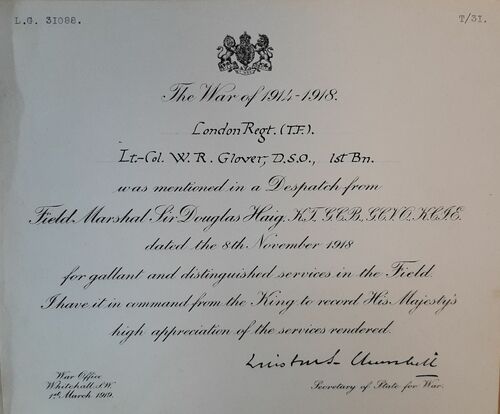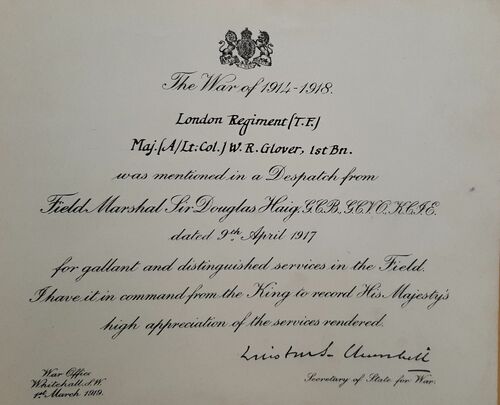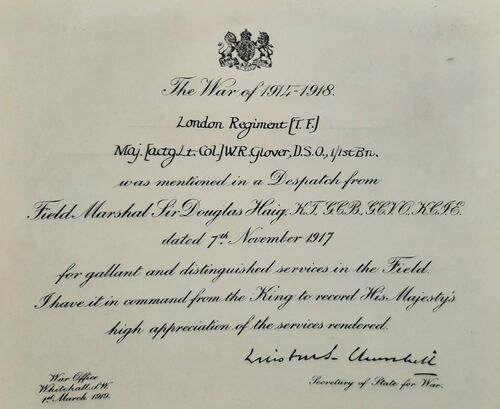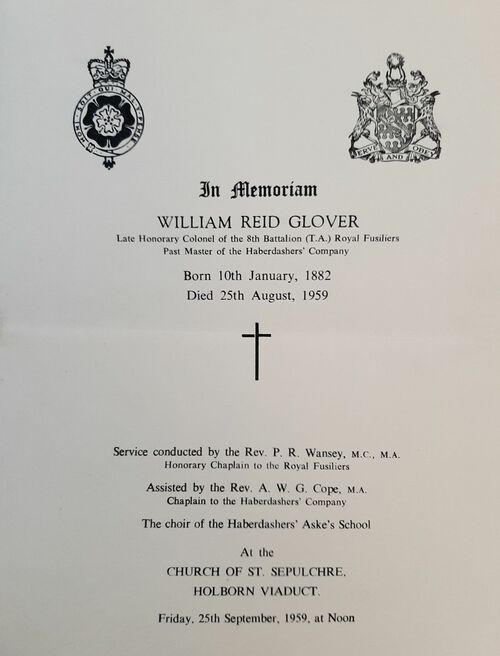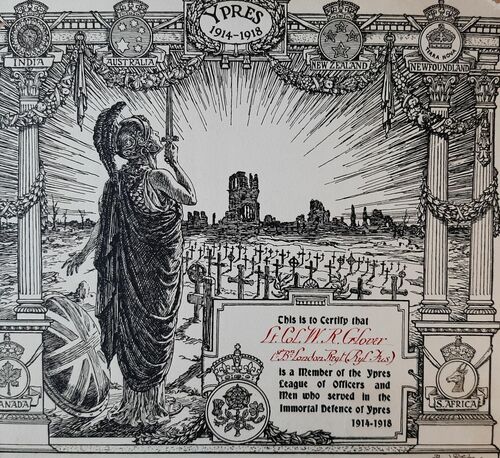Auction: 23003 - Orders, Decorations and Medals
Lot: 210
A poignant Great War C.M.G., 'Battalion Commander's 1917' D.S.O. group of six awarded to Colonel W. R. Glover, 1st Battalion, London Regiment (Royal Fusiliers), who served shoulder-to-shoulder with his brother as a Company Commander during the early days of the Great War and was present for his death
The Most Distinguished Order of St. Michael and St. George, Companion's (C.M.G.) neck Badge, silver-gilt and enamel, in its Garrard & Co. case; Distinguished Service Order, G.V.R., silver-gilt and enamel; 1914-15 Star (Major W. R. Glover. 1/Lond.R.); British War and Victory Medals, with M.I.D. oak leaves (Lt Col. W. R. Glover.); Territorial Decoration, G.V.R., hallmarks for London 1919, the last five mounted as worn and in a fitted Spink & Son case, sometime lacquered, otherwise nearly extremely fine (6)
C.M.G. London Gazette 1 January 1919.
D.S.O. London Gazette 26 September 1917, the citation followed on 8 January 1918:
'For conspicuous gallantry and devotion to duty. He commanded his battalion with great ability and fearlessness under very heavy fire. His example tended to maintain, the morale of his men under the most adverse conditions, and it was mainly due to his personal efforts that his battalion was reorganised after being compelled to fall back, and the system of defence re-established.'
M.I.D. London Gazette 25 May & 24 December 1917, 30 December 1918.
William Reid Glover was born in January 1882 at St. Pancras, London the son of Thomas and Agnes Glover. His father was the owner of the successful Gas Metre Manufacturer Glover and Main and was able to send his sons to Uppingham School. Glover arrived at the school in 1895 (Lodge 1895-1900) and was appointed as a Praposter, also playing for the Rugby XV and serving with distinction in the Cadet Force.
After leaving school he continued to play rugby to a high level with Rosslyn Park while apprenticing at his father's company. Commissioned Lieutenant with the 1st Volunteer Battalion, Royal Fusiliers (City of London Regiment) on 4 July 1900 he continued to serve as his career progressed and he became one of the earliest gas qualified engineers in the country. Upon his leaving School, Glover's younger brother Richard followed a very similar path both professionally and privately, being commissioned two years after him. Advanced Captain on 1 April 1908, in the same gazette as his brother, he was also elected a member of the Institution of Gas Engineers that year.
A Company Commander on the outbreak of the Great War, again alongside his brother, Glover was deployed with the rest of the Battalion to Malta, arriving on 3 September 1914. Posted to France on 10 March 1915, the Battalion saw their first action at Aubers Ridge in May 1915, although they were not committed to the assault directly. Later they were also present for the Battle of Loos undertaking a supporting role.
It was while conducting this vital activity that Glover's younger brother Richard was shot by a sniper. He lived long enough for his elder sibling to reach him before dying in an aid post. Glover wrote to his mother of the experience stating:
'My dearest Mater, I hope you will bear up under the saddest news, the very worst. We have lost our Richard this morning. I was with him when he passed away, very calmly and peacefully & without pain. He was quite unconscious all the time. Our doctor is sure that he cannot have suffered at all. He was hit in the side of the head by a sniper although he was stooping down at the time and not taking any risks.'
Despite his loss Glover was to survive this first year of the war, being promoted Major on 23 May 1916, a rank he was holding when they went into action their first major battles during the Somme Offensive. Here they performed well, going into action for the first time alongside tanks at the Battle of Flers-Courcelette in September 1916. They saw their heaviest fighting in this month, although engaged several more times in October before the Offensive finally ended, Glover himself commanded his Battalion from November 1916-March 1917 earning a 'mention' for his efforts in that time.
The Battalion Commander, Lieutenant-Colonel Duncan Smith took command again prior to the Battle of Arras in which the Battalion played a heavy role from 9 April. During this action - what came to be known as the First Battle of the Scarpe - Lieutenant-Colonel Duncan Smith was severely wounded, later succumbing to his wounds. When the action was done Glover again took command in time to lead them through the 3rd Battle of the Scarpe, when they faced appalling losses in the face of a pinpoint defensive barrage.
Despite taking a mauling in the latter action they were thrown back into the fighting soon during the Battle of Passchendaele and it was likely for this offensive that Glover received his D.S.O. When heavy in the heavy fighting, the commander of the 1/7th Battalion, Middlesex Regiment was wounded he was forced to take command of both units to halt a German counter-attack. In spite of these losses they were not reinforced but instead pushed into the line to guard against a German counter-attack following the Battle of Cambrai in November 1917. Glover was again 'mentioned' on 24 December 1917, certainly earned having held his Battalion together in good order during the Chaotic and brutal fighting of the previous six months.
They were largely in reserve during the Spring Offensive and as such the Battalion was at the forefront of the Allied counter-offensive during the Hundred Days. They attacked with enormous success at the Battle of Albert on 23 August 1918, seeing further action at Canal-du-Nord, the Sambre and Blaregnies.
Glover rounded out the Great War with another 'mention' on 30 December 1918 and promotion to Lieutenant-Colonel, a rank he had been acting in for almost a year and a half at this point. The appointment to the Order of St. Michael and St. George came with the New Years' honours 1919, doubtless a reflection of his efforts throughout the conflict.
Glover's father died just two years after the end of the war and he took over the family firm as a result. Further to this he was appointed Master of the Haberdashers' Company, Lieutenant of the City of London, Justice of the Peace for Middlesex and President of the Rosslyn Park Rugby Club. He also remained in the Territorials and was appointed Honorary Colonel of the 8th Battalion, Royal Fusiliers in 1947. Eventually selling the family firm Glover moved to Hampshire where he died in 1959; sold together with a large archive of original material comprising:
i)
Documents of bestowal for both the C.M.G. and D.S.O. along with related correspondence from the Central Chancery confirming the former award.
ii)
The Statutes of the Distinguished Service Order.
iii)
Three Mention in Despatches certificates.
iv)
An Ypres League certificate named to 'Lt. Col. W. R. Glover', heavily foxed.
v)
Several photographs of the recipient in uniform and including two group photographs.
vi)
A caricature of an officer of the 7th Royal Fusiliers.
vii)
A typed biography of the recipient including quotes from his own letter referring to the death of his brother.
viii)
Memorial order of service.
ix)
Pen stand made from a spent artillery shell and a flask.
x)
Newspaper obituary.
xi)
A swagger stick with silver Royal Fusiliers crest.
xii)
Copied research including London Gazette entries, an article in The Old Uppinghamian and an M.I.C.
Subject to 20% VAT on Buyer’s Premium. For more information please view Terms and Conditions for Buyers.
Sold for
£2,900
Starting price
£1400

